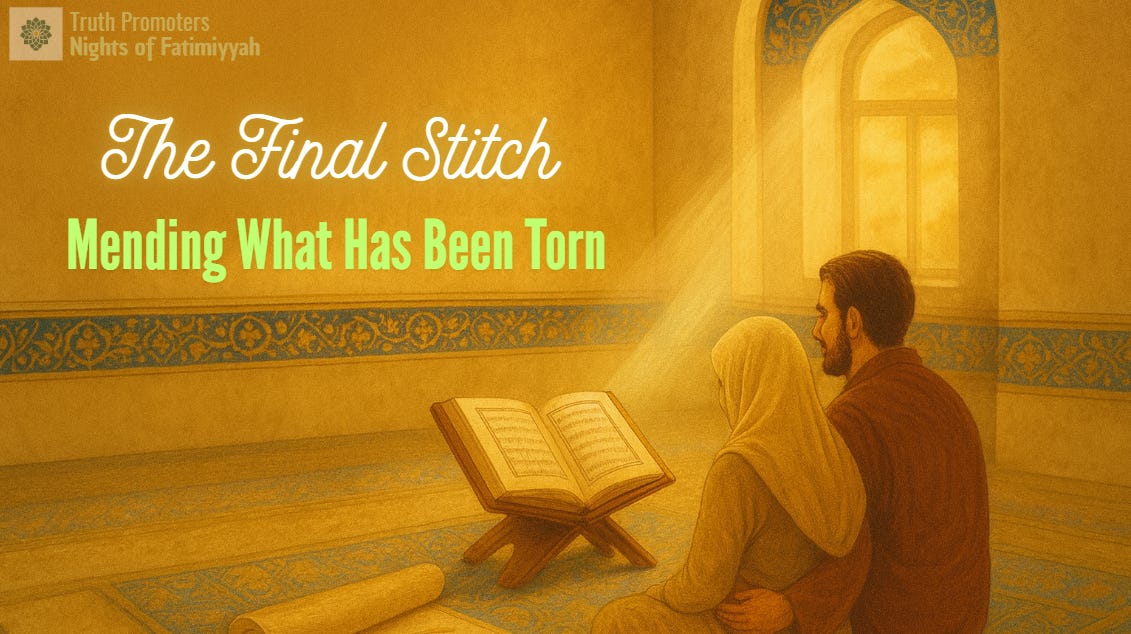The Final Stitch — Nights of Fatimiyyah: Mending What Has Been Torn
As the final stitch is laid, the Fatimiyyah series ends with a call to mend what has been torn—restoring trust, confronting injustice, and weaving the home anew with mercy, truth, and wilayah
GLOBAL, PUREWILAYAH.COM, 24 November 2025 / 3 Jumadil Akhir 1447— The third and final night of the Fatimiyyah commemoration, marking the martyrdom of Sayyida Fatima al-Zahra (AS), was held on Sunday evening, 24 November 2025 (3 Jumadil Akhir 1447) and broadcast live on YouTube. Organized by Truth Promoters, the night brought the three-part series to a close with Qur’anic recitation, poetic reflections, a detailed sermon, maqtal, nohe, and a closing communion.
Livestream:
The program opened with Qur’anic verses previously recited on earlier nights, reinforcing divine principles of dignity, patience, and God-centred family life — a spiritual backdrop that framed the evening’s central message. This was followed by the poetic couplet “When Hardship Wears the Cloth of Ease,” reflecting on how the tears of Sayyida Zahra (AS) illuminate the believer’s path through adversity and echo the Qur’anic promise that with hardship comes ease.
When the Fabric of Marriage Tears
Sheikh Shabbir Hassanally closed his three-part “Wilayah in the Home” series with a piercing examination of what happens when the fabric of marriage begins to tear.
He reminded the audience that marriage in Islam is a mithaq ghalidh — a weighty covenant with Allah as the unseen third partner — and that when crises erupt, Islam does not abandon the couple. It provides structure: diagnosis, accountability, healing, mediation, and when all else fails, separation with dignity.
He identified two major forces that rupture marriages from within: inner corruption and unchecked desires. Sheikh Shabbir warned that addictions — particularly pornography and digital fantasy — “poison” the soul, distort expectations, and extinguish mawaddah and rahmah.
Neglect, narcissism, emotional manipulation, and the betrayal of hiding spiritual or moral decay before or during marriage hollow out the relationship, turning spouses into tools rather than garments of protection.
The lecture then targeted external interference as a destructive “third peg” that tears a marriage apart. Overbearing parents and in-laws who gossip, incite, or undermine the couple fall among “those who cause separation between loved ones.”
Honouring parents is obligatory, he said, but sabotaging a marriage is a sin. Islam grants every couple the right to a maskan mustaqil — an independent home free from suffocating interference, proxy parenthood, and dynamics that erode accountability within the family.
Sheikh Shabbir concluded with a warning on corrupt mediators who misuse religion to protect abusers or exploit the vulnerable. The Qur’anic mandate of appointing two hakam is a sacred trust requiring knowledge, piety, and loyalty to truth alone. Protecting families, he insisted, demands confronting internal sicknesses, resisting external interference, and upholding divine justice — for a home built on wilayah cannot survive on silence, excuses, or fear.
The full lecture is available here:
Maqtal: Her Final Days and the Testimony of a Hidden Grave
The maqtal, recited by Hassanain Dewni, recounted the final days of Sayyida Fatima al-Zahra (AS) with solemn clarity. It described her withdrawal to Bayt al-Huzn after the usurpation of Fadak, where she poured her grief before Allah while tending to her children with unwavering devotion.
The narrative highlighted her refusal to grant legitimacy to those who wronged her, turning her face away and allowing her silence to stand as a lasting indictment of oppression. It concluded with her final counsel to Imam Ali (AS), her request for a night burial, and the concealment of her grave — a deliberate, enduring testimony against the injustices she endured.
The full Maqtal is available here:
Nohe: “Garden of Zahra” — Light Against Tyranny
The nohe “Garden of Zahra,” recited by Abdullah Al-Mukhliss, portrayed the spiritual confrontation between the forces of tyranny and the enduring light of Sayyidah Fatima (AS). It reflected on how her name overwhelms the agents of oppression and how the trials of her family — from Madinah to Karbala — echo across generations, inspiring resilience, defiance, and hope among believers.
The Nohe is available here:
Communion: Approaching the Divine Through the Lady of Light
The closing communion renewed the call for believers to approach Allah through the intercession and spiritual presence of Sayyida Fatima al-Zahra (AS). Repeated throughout the three nights, it emphasized sincerity, humility, and a deeper remembrance of the Daughter of Mercy.
Hyder AI Expands Global Access to the Fatimiyyah Series
As part of the ongoing collaboration between Truth Promoters and Hyder AI, all lectures delivered by Sheikh Shabbir Hassanally — including this Fatimiyyah series — are now accessible in multiple languages for global audiences.
🔗 Explore multilingual lectures: https://www.hyder.ai/en/scholar/56
The final night of Fatimiyyah brought the series to a powerful close: a reminder of the moral weight of family responsibilities, the necessity of protecting the sanctity of the home, and the enduring light of Sayyida Fatima al-Zahra (AS) as a guide for confronting injustice.
Through Qur’anic reflection, devotional recitations, and a deeply structured sermon, Truth Promoters concluded the three-night commemoration with a call to rebuild homes on truth, compassion, and God-centred integrity. (PW)





